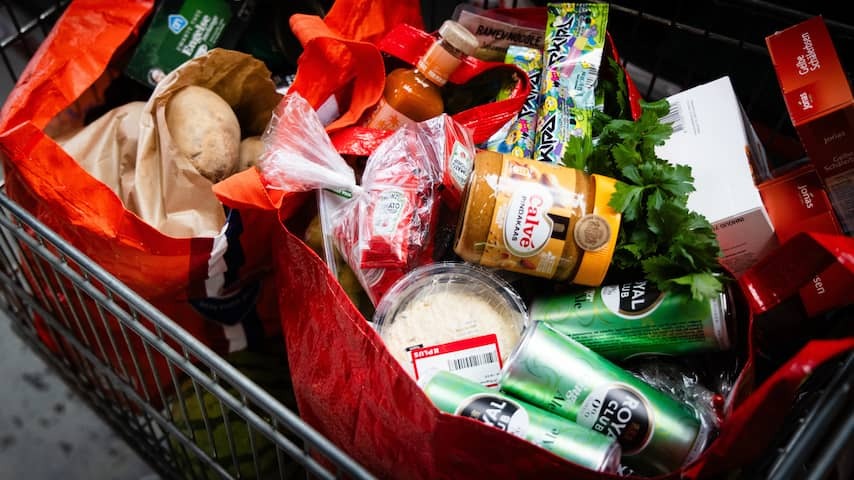
The Dutch waste less and less eating, but that is not good news for everyone. Food Banks Nederland receives fewer and fewer products to make packages and needs to look for alternative solutions. “We are more often dependent on other donors.”
The food waste in the Netherlands decreased by 17 percent between 2015 and 2023, showed the new food waste Monitor on Friday. For the time being, authorities will continue to focus on less waste: the goal is to halve food waste in five years compared to 2015.
Food Banks The Netherlands welcomes this, but is also worried. Less food waste also means that there is less available for around 150,000 people who depend on food aid. The organization has been worried about this for some time.
“Our commitment is to provide customers with healthy and varied food, and at the same time combating food waste,” says Henk Staghouwer of Food Banks Nederland. “But we see that our food supply will come under further pressure in the coming years. And that is worrying.”
Food banks are largely dependent on donors, such as supermarkets, suppliers and producers. They often deliver products that are almost over the expiry date. According to the organization, this influx of products decreases by 8 percent annually.
Process surpluses into soup
According to Food Banks Netherlands, this is because supermarkets are increasingly highlighting products if they are on the expiry date. The things disappear in the shopping cart or the customer’s basket. “It is precisely those products that often ended up with us,” says spokesperson Eva Hersbach of Food Banks Nederland to Nu.nl.
Food suppliers are also increasingly processing their surpluses into biofuel. Hersbach: “We think that’s a shame, because we can use those products very well.”
The organization is therefore talking to suppliers and supermarkets. “Super good that you, for example, drop out products for the best -before date, but that means fewer products for us. Also think of us.”
In the meantime, food banks must look at creative solutions. This way products can be purchased themselves, but money is needed for that. “We are more often dependent on financial donors. For example, milk is now purchased with a European subsidy.”
Another option is that surpluses of non-containing products, such as fruit and vegetables, are processed into sustainable products. Think of soups or sauces. “Other parties are already doing that for consumers. But we are now talking to whether we can do this for our customers.”
The Dutch Are Wasting Less and Less Food, But that’s not good news for Everyone. Food Banks Netherlands is Receiving Ferwer and Fewer Products to make packages from and has to look for alternative solutions. “We are more ofes Dependent on Other Donors.”
Food waste in the Netherlands decreased by 17 percent between 2015 and 2023, Accordance to the New Food Waste Monitor on Friday. Authorities will Continue to focus on reducing waste for the time being: The Goal is to Half Food Waste in Five Years Compared to 2015.
Food Banks Netherlands welcomes this, but is also a group. Less Food Waste also Means That Less is available for some 150,000 people who depend on food aid. The Organization Has Been Concerned about this for some time.
“Our Aim is to provide customs with healthy and varied food, and at the same time combat food waste,” Says Chairman Henk Staghouwer or Food Banks Netherlands. “But we see that our food supply will come under further pressure in the coming years. And that is worrying.”
Food Banks Are Largely Dependent on Donors, Such as Supermarkets, Suppliers and Producers. They often supply products that are almost fits their expiration date. Accordance to the Organization, This Flow of Products Decreases by 8 percent Every year.
Process Surpluses Into Soup
Accordance to food Banks Netherlands, this is because supermarkets are increasingly discount products when they are close to their expiration date. The items disappear into the customer’s shopping cart or basket. “These Were Precisely the Products that ended up with us,” Says Spokeswoman Eva Hersbach or Food Banks Nederland To Nu.nl.
Food Suppliers are also Increasingly Processing Their Surpluses Into Biofuel. Hersbach: “We think that’s a shame, because we can use those products very well.”
The Organization is Therefore Talking to Suppliers and Supermarkets. “It’s great that you are discount products close to their expiration date, for example, but that mean fewer Products for us. Think of us too.”
In The Meantime, Food Banks Have To Look for Creative Solutions. For Example, Products Can Be Purchased Themselves, But this Requires Money. “We are more ofes Dependent on Financial Donors. For Example, Milk is now purchase with European subsidies.”
Another Option is that surpluses of non-durable products, such as vegetables and fruit, are processed into durable products. Think of soups or sauces. “Other Parties are already doing this for consumers. But we are now in discussions about Whether we can also do this for our customers.”